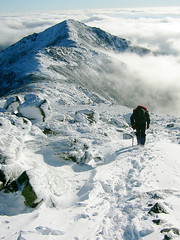High profile rescue in the White Mountains
Looks like two hikers were up on the Franconia Ridge without heavy winter gear or overnight kit. Twenty four rescuers and a Blackhawk helicopter from the Army National Guard were involved. One hiker, the more experienced of the two, didn't survive the incident.
Here is the Monitor article, and here is the more detailed Forest Service report.
Col. Jeffrey Gray, Chief of Law Enforcement at Fish and Game is quoted as saying,
"Winter hikers should not hesitate to turn back or postpone outings when severe weather is predicted or encountered. Even the best of clothing and equipment may be no match for the severe winter weather often encountered in New Hampshire's White Mountains!"
I've hiked by that spot at least a dozen times, it's scary to think about what it was like up there the last few nights. When I read the article I was reminded of the hundreds of calls I've made as a winter hiker, to continue or to turn back. To bring a certain piece of equipment or not. Then I was reminded of the calls I've made as a trip leader for other people. It's pretty real up there this time of year. My heart goes out to the families of the hikers.
Update 2/13: NECN has video of their coverage here.
Update 2/28: Another rescue took place in the same spot over the weekend. This one had a happier ending. I wonder if this is a usual amount of traffic for this time of year?








